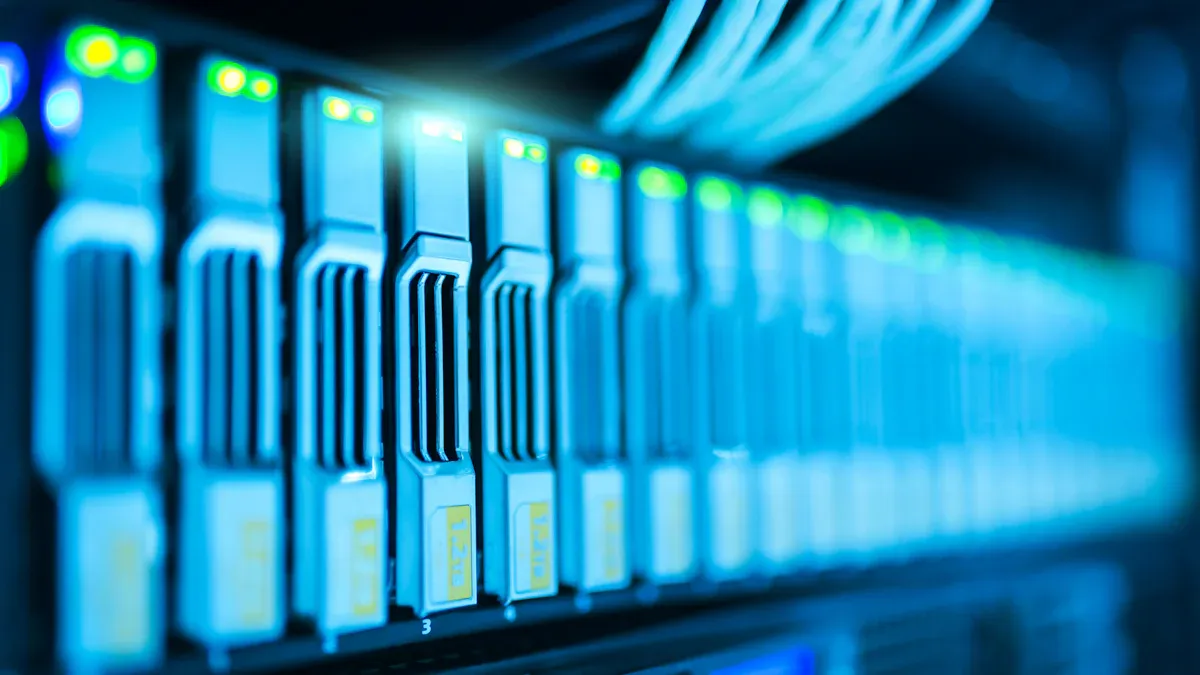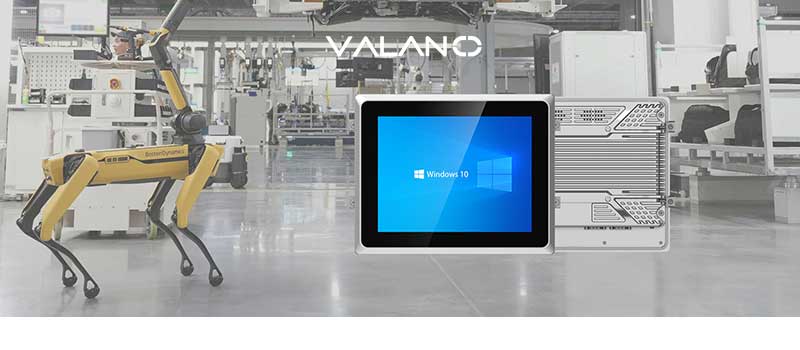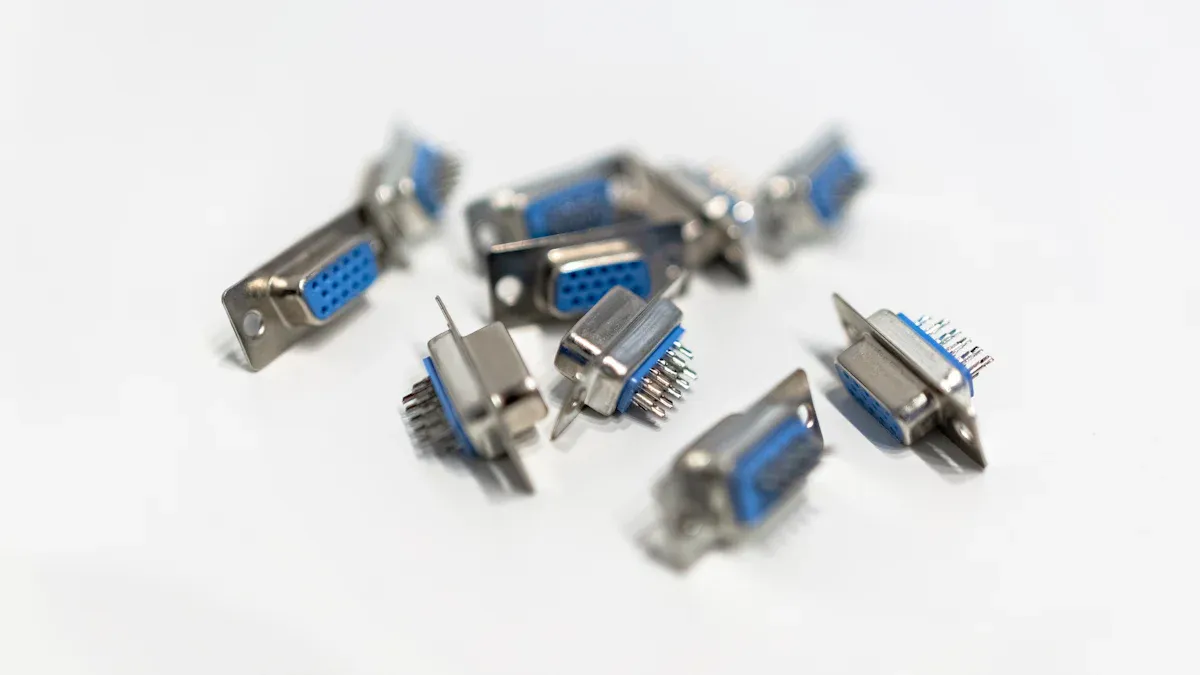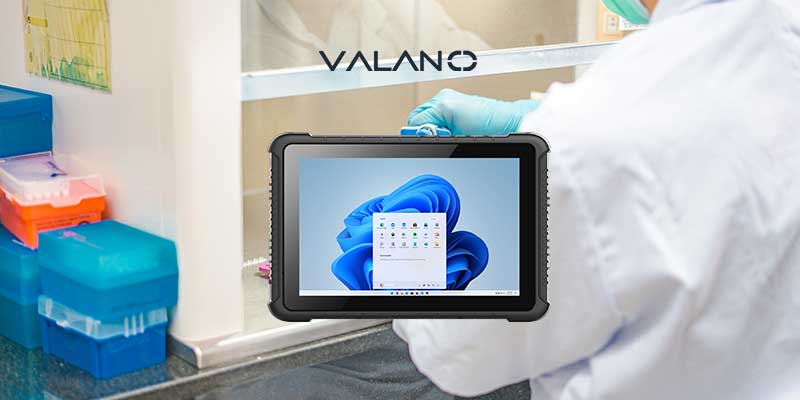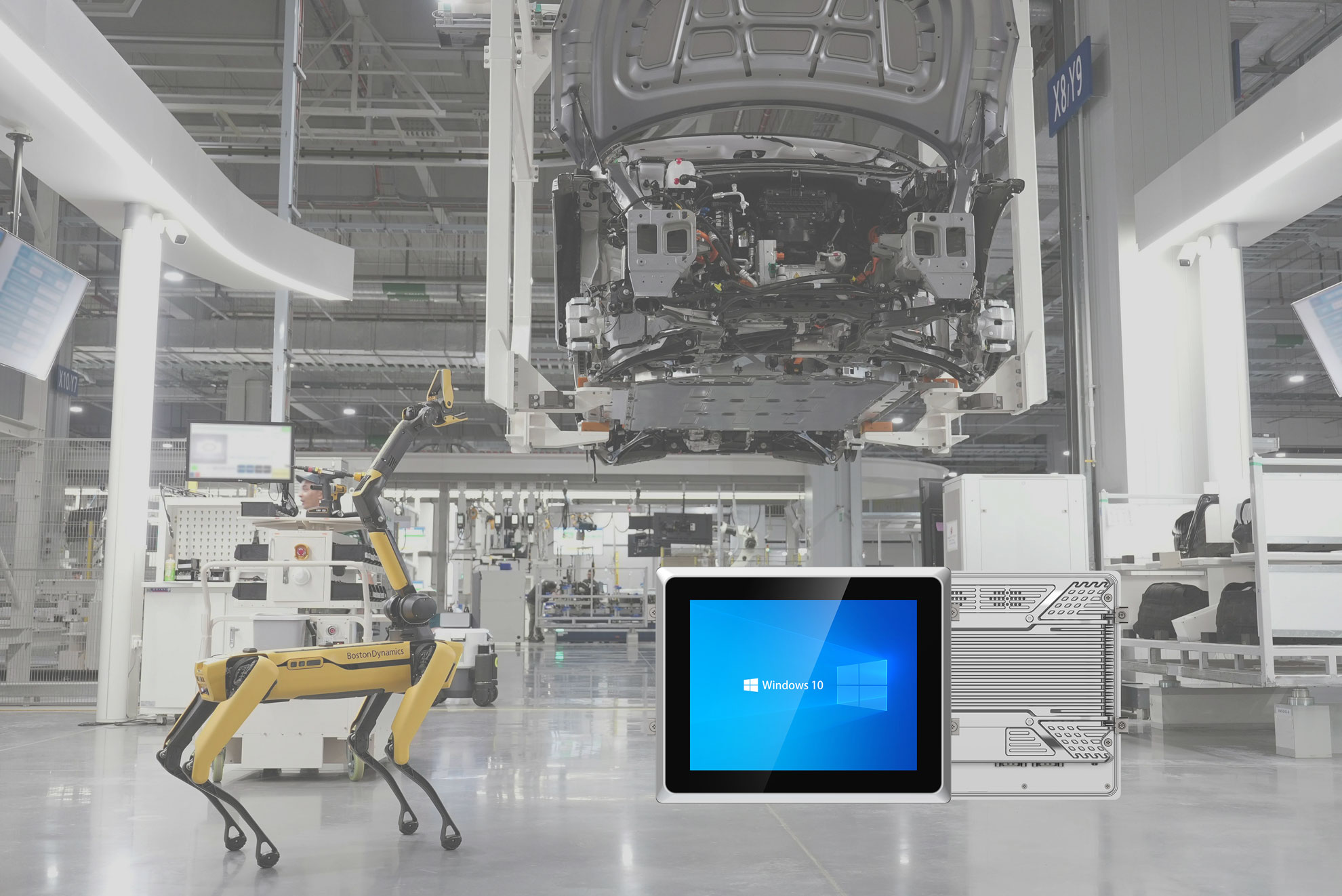
An HMI Panel PC connects people and machines in factories. It has a computer and a touchscreen, making it easy to control and check processes. These devices turn hard-to-read data into simple information, helping you decide quickly and wisely.
They are very important in factories. For example:
The global HMI software market might grow 10.4% yearly, reaching $11.60 billion by 2030.
This shows the need for better tools in Industry 5.0.
HMI Panel PCs make work faster, cut downtime, and predict problems. They help improve both productivity and product quality in many industries.
Key Takeaways
HMI Panel PCs are computers with touchscreens to control machines easily.
They help workers save time and make fast decisions using live data.
These devices are tough and can handle dust, water, and heat.
You can customize them to fit your business and industry needs.
To pick the best one, check its speed, connections, and support.
Understanding HMI Panel PCs
What is an HMI Panel PC?
An HMI Panel PC is a device with a computer and touchscreen. It lets people control and monitor machines in factories. Unlike older HMIs, it has built-in computing power, making it more useful. You can use it to check and manage processes instantly.
The history of HMI Panel PCs shows how technology has improved:
1980s: Buttons and dials were used to monitor machines.
1990s: Computers and Ethernet made control easier and faster.
2000s: Touchscreens and tough designs became common in factories.
2010s: Multitouch and mobile devices made teamwork better.
"Old HMIs only controlled machines. Now they connect and share data." – John Krajewski, Director of Product Management for HMI Supervisory, Invensys.
Core Features of an HMI Panel PC
HMI Panel PCs are built for tough factory conditions. Their main features include:
Durability: They handle dust, water, and extreme heat or cold.
Performance: They work reliably in important tasks without failing.
Rugged Design: They resist shocks, have no fans, and last longer.
Connectivity: They easily link to factory networks and devices.
These features make them very useful in modern factories.
Why HMI Panel PCs Are Essential in Industrial Automation
HMI Panel PCs are key to keeping factories running smoothly. Workers can use them to open valves or stop machines through connected controllers. This reduces delays and keeps things working well.
For example, in medicine production, they track temperature, pressure, and ingredients. Alerts warn about problems to keep products safe and high-quality. In food factories, they show recipes and improve production, cutting waste and ensuring good results.
Industry | What They Do | Benefits |
|---|---|---|
Pharmaceutical Manufacturing | Tracks medicine production, showing temperature, pressure, and ingredient data. | Alerts help keep products safe and meet rules. |
Food and Beverage Processing | Manages recipes and production rates in food factories. | Improves efficiency, reduces waste, and ensures consistent quality. |
Building Management Systems | Controls heating, cooling, lights, and security in buildings. | Real-time monitoring helps fix problems quickly and improves building performance. |
HMI Panel PCs make factories safer, faster, and more reliable.
Features and Benefits of Industrial Panel PCs

Strong Build for Tough Workplaces
Industrial panel PCs are made to handle tough conditions. Their strong build helps them work well in harsh places. They resist shocks and vibrations, meeting strict military rules like MIL-STD-810G. They can take up to 50Gs of shock and 5 GRMs of vibration. Their IP ratings, from IP65 to IP69K, keep out dust and water. This makes them great for factories, outdoor sites, and other hard environments.
They also work in extreme temperatures, from -40℃ to 85℃. Fanless heatsink technology keeps them cool without needing fans. This design lowers maintenance and makes them last longer.
Feature | Description |
|---|---|
Strong Build | Made to survive tough workplaces, ensuring they last long. |
Temperature Control | Uses fanless heatsinks to stay cool, even in dusty areas. |
Easy-to-Use Touchscreens
Touchscreens make industrial panel PCs simple to use. They cut down on training time and make hard tasks easier. You can use them with gloves, thanks to capacitive and resistive touchscreen options. This makes them useful in many situations.
Touchscreens also help you work faster and more accurately. They guide you step by step, reducing mistakes. Workers can check machines from a distance, staying safe. Real-time data helps you see problems quickly and make smart choices.
Evidence Type | Description |
|---|---|
Easier Workflows | Touchscreens make hard tasks simple, saving time and effort. |
Less Training Needed | Easy controls help workers learn faster with less training. |
Better Awareness | Real-time data shows what’s happening, helping quick decisions. |
Great Connectivity and Integration
Industrial panel PCs connect easily with other devices and systems. This allows smooth communication and sharing of data. Real-time monitoring and analysis improve decisions and boost productivity.
By linking to factory networks, these PCs make work more efficient. They also help industries keep up with modern technology. With advanced connection features, they help businesses stay competitive.
Customization and Scalability for Specific Needs
HMI Panel PCs are special because they adjust to your needs. You can change their hardware or software to match your work. Whether you need a certain screen size or more power, they can be customized.
These systems also grow with your business. You can add features or improve them without buying new ones. This saves money and keeps your work running smoothly.
In factories, HMI systems are very important. For example, in medicine production, they show real-time data and send alerts. This helps keep products safe and meet rules. In food factories, they display recipes and track production rates. This makes work faster and keeps quality steady.
Buildings also use these devices. Touchscreen PCs help control heating, cooling, lights, and security. They make buildings work better and easier to manage.
Tip: Pick an HMI Panel PC that fits your needs now and later. A system that grows with you is a smart choice.
HMI Panel PCs are built to last and adjust to changes. They help you stay ahead in your industry and meet your goals.
Comparing HMI Panel PCs and Traditional HMIs
Key Differences Between HMI Panel PCs and Traditional HMIs
HMI Panel PCs and traditional HMIs are quite different. HMI Panel PCs have better computing power and easier-to-use screens. Traditional HMIs use older technology and are less advanced.
Metric | HMI Panel PCs | Traditional HMIs |
|---|---|---|
Processing Power | Faster and more powerful | Slower and less efficient |
Software Compatibility | Works with many software types | Limited to specific software |
User Interface Capabilities | Multi-touch and gestures supported | Single-touch, older touch technology |
Screen Size | Bigger screens available | Smaller screens, usually 4-12 inches |
Operating System | Open system, allows new software | Closed system, limited options |
Development Flexibility | Easy to switch between vendors | Hard to transfer projects |
These differences show why HMI Panel PCs are better for today’s factories. Their open systems and bigger screens help with harder tasks.
Advantages of Using HMI Panel PCs
HMI Panel PCs have many benefits for factories. They combine a computer and touchscreen in one device, saving space and making setup easier.
User-Friendly Interface: Touchscreens are simple to use and reduce mistakes.
Durability: Strong design works well in tough factory conditions.
Versatile Connectivity: Connects easily to many devices and systems.
Real-Time Monitoring: Shows live data, helping workers make quick decisions.
These devices also save space by needing fewer wires. Their strong build makes them last longer, which is great for automation work.
Limitations of Traditional HMIs in Modern Applications
Traditional HMIs struggle to meet today’s factory needs. Their closed systems don’t allow new software, making them less flexible. Moving projects between systems is also harder.
Limitation/Challenge | Description |
|---|---|
Closed Operating System | Can’t install new software due to limited systems. |
Compatibility Issues | Different software doesn’t work well together, causing problems. |
Increased Costs and Development Time | Fixing these issues takes more time and money. |
These problems make traditional HMIs slower and more expensive, which is not ideal for modern factories.
Applications of HMI Panel PCs in Industrial Settings

Manufacturing and Production Processes
HMI Panel PCs are important in factories. They help control and monitor machines in real-time. This keeps production running smoothly. These devices fit easily into production lines. They handle tasks like assembly, quality checks, and packaging. Operators can quickly make changes using the touchscreens. This reduces delays and boosts efficiency.
These panel PCs often use HMI and SCADA software for automation. Their strong design, with fanless cooling and tough screens, ensures they work well in factories. They also collect important data to help workers make better choices. For example, in medicine production, they track temperature and pressure. This helps meet strict safety rules.
Industry | What They Do | Growth Rate |
|---|---|---|
Pharmaceutical Manufacturing | Tracks medicine production, monitoring temperature and pressure. | 5.75% CAGR by 2033 |
Food and Beverage Processing | Manages recipes and production rates for better efficiency. | N/A |
Building Automation Systems | Controls heating, lights, and security in buildings. | N/A |
These examples show how HMI Panel PCs improve productivity and keep quality high.
Transportation and Logistics Operations
In transportation, HMI Panel PCs make work easier. They help manage vehicles and track them in real-time. Route tools find the best paths, saving fuel and time. These systems also track cargo, giving updates to ensure deliveries are on time.
Application | What It Does |
|---|---|
Fleet Management | Tracks and manages vehicles effectively. |
Route Optimization | Finds the quickest and most efficient routes. |
Cargo Tracking | Monitors shipments to ensure timely delivery. |
Using these panel PCs in logistics improves efficiency and keeps supply chains organized.
Energy and Utilities Management
HMI Panel PCs are useful in energy and utilities. They monitor systems in real-time to keep them working well. In power plants, they track energy production and fix problems fast. In water treatment, they control filtration and chemical levels to meet safety rules.
These panel PCs are great for IIoT tasks in energy. They connect with sensors and devices to predict problems and cut downtime. Their strong build works well in tough environments, making them perfect for managing utilities.
Tip: Choose an HMI Panel PC with good connectivity and a strong design for energy tasks.
These examples show how HMI Panel PCs are helpful in many industries, from factories to energy management.
Real-World Examples of HMI Panel PC Applications
HMI Panel PCs have changed how industries work by solving problems. Here are some examples of how they help in real life:
Automotive Manufacturing:
Car factories use HMI Panel PCs to watch assembly lines. Workers can control robotic arms and check production speed. These systems also help find and fix mistakes in welding or painting. A big car company uses them to make cars faster and better.Oil and Gas Industry:
Oil refineries depend on HMI Panel PCs to check pressure and temperature. They spot leaks or broken equipment early to avoid big problems. For example, a Texas refinery uses them to watch pipelines, cutting downtime and improving safety.Renewable Energy Plants:
Solar and wind farms use HMI Panel PCs to track energy production. They show when repairs are needed and keep systems running well. A solar farm in California uses them to check solar panel performance for maximum energy.Food Processing Plants:
Food factories use HMI Panel PCs to manage recipes and check production. A snack company uses them to keep flavors the same and reduce waste.
Note: These examples show how HMI Panel PCs work in many industries. They are important tools for today’s factories and plants.
Choosing the Right HMI Panel PC
Things to Think About When Picking an HMI Panel PC
Picking the right HMI Panel PC needs careful thought. First, check if it’s powerful and reliable. Make sure it has enough speed, memory, and storage for your tasks. Look for certifications that prove it can handle tough conditions.
Next, think about how it connects to other devices. Does it support Ethernet, serial ports, or other connections? Expansion options are important too, so you can upgrade later if needed.
Durability is key in factories. Choose a panel PC with a strong design and good IP ratings to block dust and water. Check the screen size, brightness, and resolution to ensure it works well in different settings. Also, think about how it will be mounted for easy use by workers.
Tip: Match the panel PC’s features to your task’s needs for smooth performance.
Meeting Industry-Specific Needs
Each industry has its own needs, so pick an HMI Panel PC that fits. For example, in factories, it should handle heat, shaking, and moisture. In cleanrooms, it needs a smooth surface that’s easy to clean.
Think about how workers will use it. For safety tasks, keep key controls as physical buttons. Other functions can go on the touchscreen. Make sure it works with your current systems and protocols.
The screen is also important. A bigger, brighter screen with high resolution helps in dark areas. The processor and memory should match your software needs to avoid slowdowns.
Why Vendor Support and Customization Matter
Good vendor support and customization can make your HMI Panel PC last longer. Pick a company that offers great customer service and regular updates. This keeps your device working well over time.
Customization lets you adjust the panel PC to your needs. You can choose the screen size, add ports, or install special software. A flexible design helps the device grow with your business and adapt to new tech like IIoT.
Note: Work with a vendor who knows your industry. This makes setup easier and boosts efficiency.
HMI Panel PCs have changed how factories work by making tasks easier and faster. These devices started as simple controls but now connect people, machines, and apps smoothly. They are built to last in tough places, with features like fanless cooling and small designs that fit modern industries.
How HMI Panel PCs Have Improved | Benefits They Provide |
|---|---|
From basic controls to smart systems | Makes work easier and shows data clearly |
Helps make quick decisions | Predicts problems and allows remote fixes |
Gives mobile access to data | Links people, machines, and apps everywhere |
These devices help workers fix and check systems quickly. They work well with HMI/SCADA software, making it easy to watch and control processes. This makes them a smart choice for long-term use in factories.
Tip: Think about your factory’s needs and pick an HMI Panel PC that works best for your tasks.
FAQ
What makes an HMI different from an HMI Panel PC?
An HMI is a simple tool to control machines. An HMI Panel PC has a computer inside. It offers advanced features like touchscreens, better connections, and faster data handling.
Can HMI Panel PCs handle tough environments?
Yes, they are built for hard conditions. They resist dust, water, and extreme heat or cold. Many models meet strict industrial rules like IP65 and MIL-STD-810G.
How do HMI Panel PCs boost productivity?
They make controlling and checking machines easier. Real-time data helps you act fast and avoid delays. Their easy-to-use screens also reduce mistakes and training time.
Do HMI Panel PCs work with current systems?
Most HMI Panel PCs connect well with factory devices and networks. They use common tools like Ethernet and USB to share data smoothly.
Which industries use HMI Panel PCs the most?
Factories, energy plants, and shipping companies use them often. They help improve work, keep things safe, and give live updates for smarter choices.


